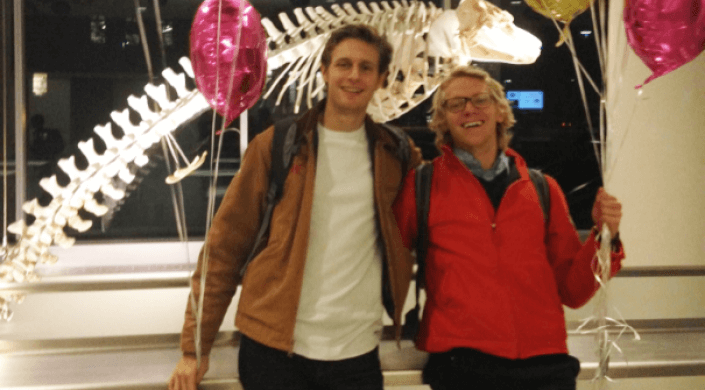News
Computer science concentrators Luke Heine (right) and Mark Steinbrick launched a website to help their peers connect during summer travels.
With his freshman year coming to a close, Luke Heine, A.B. ’17, was excited to spend the summer in Italy for a Harvard study abroad program. As he discussed summer plans with his dorm-mates, Heine learned that several of his peers would also be studying abroad in Southern Europe.
That gave him an idea: What if there was a way to connect students who would be traveling to different parts of the world during summer break? He reached out to his classmates through social media, gathering information on where they would be spending their summers, and then created a Google map that pinpointed each student’s location. Heine ended up listing 800 locations in 36 countries (he pulled an all-nighter to manually plot each point).
When he returned to school last fall and heard from students who used his map to meet up with peers all over the world, Heine knew he was onto something. A computer science concentrator at the John A. Paulson School of Engineering and Applied Sciences, he also knew he could use his training to create a more sophisticated web application.
In collaboration with fellow computer science concentrator Mark Steinbrick, A.B. ’17, and childhood friend Billy Bauer, who is currently attending Stanford University, Heine developed the Summer Playbook. The online tool features a world map that pinpoints cities where Ivy League students will be traveling during the summer, enabling students visiting the same city to connect, Heine explained.
“The college experience is amazing because of the people you get to meet. That experience shouldn’t end at term time,” Heine said. “The whole point of the playbook is to continue to meet new people and exchange ideas throughout the summer.”
Students create an account in the Summer Playbook and list their location and the dates they will be traveling. They also select activities of interest, such as having a meal with a fellow student, hosting a traveler, or showing someone the sights. After they input their own information, users can access the world map.
Heine’s experience in Italy convinced him to expand the playbook to include other Ivy League universities. As he was packing up to leave the Tuscan city of Siena, he learned that a group of Yale students had been in town for a summer program. He regretted the missed opportunity to meet up with peers.
“There’s a lot of shared culture between the Ivy League schools,” Heine said. “One piece of that shared culture is the focus on travel for internships, study abroad, or vacations. Students end up all over the world every summer.”
So as Heine and his collaborators worked on the project last spring, he developed ambassador teams at other universities to promote the playbook. It quickly caught on. The 2015 Summer Playbook drew 3,411 users from all Ivy League universities. In fact, fewer than half of the users hailed from Harvard. Students connected with peers in 4,407 locations spread across every continent except Antarctica.
The diversity of locations is matched only by the variety of stories from users. One student was delighted to connect with a friendly face from Yale, especially since they were both spending the summer on the tiny island of Mauritius, in the middle of the Indian Ocean. Another student reached out to a peer for help navigating the winding streets of central Copenhagen. Closer to home, one user enjoyed lunch with a fellow student in New York City who she thought she had never met, only to find out her lunch-mate was also her classmate in kindergarten.
“Student are having life-changing experiences through the playbook that wouldn’t happen otherwise,” Heine said.
Those stories inspired him and his colleagues to enhance the playbook for next summer. They are adding several new features, such as the ability to share travel tips with fellow users. The next version will also show locations and contact information for Harvard alumni clubs all over the world. The developers are considering opening the system to students at other major universities, and enabling users to restrict their information so it is only visible to peers at certain schools.
“This project has allowed us to take what we’re learning in our classes at SEAS to the next level. It has been a great experience for us to figure out how to solve problems and create winning situations for our users,” Heine said. “It has been very rewarding, too, because we are helping create a sense of community for students, no matter where they are in the world.”
Cutting-edge science delivered direct to your inbox.
Join the Harvard SEAS mailing list.
Press Contact
Adam Zewe | 617-496-5878 | azewe@seas.harvard.edu
